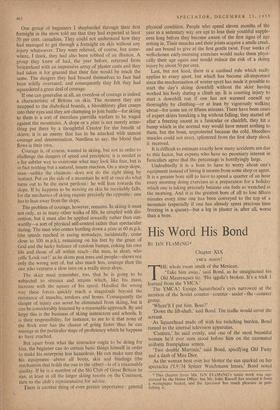Winter Sports
BY ERNST VON GLASERSFELD* NOT so long ago the word 'skiing' conjured up in Britain a picture either of decorative children tumbling in the snow, or of daring young men flying through the air with gay abandon, long woollen scarves trailing from their necks. Even in the early Thirties, when the old alpenstock --once known as the 'shaft of fear'—had been supplanted by two light sticks, and all the essentials of modern skiing tech- nique had been evolved, the picture that remained in many English minds was of a hero—of course, an expert skier— pursuing villains down a mountainside, nimbly leaping °tier fences, trees, and even express trains: a strip cartoon sport.
Now, skiing has ceased to be a source of fantasy. The development of the winter sport centres during the last two or three decades has brought it within everybody's reach. The stigma of childishness vanished on closer inspection; so did the association with flying supermen—though that persists in a British tendency still to dress for skiing in much the same way as did the flying young man on the Christmas card (with a trailing woollen scarf and socks outside the trousers) and an ambivalent feeling regarding the dangers of the sport.
' Literary Editor of Der Standpunkt. One group of beginners I shepherded through their first fortnight in the snow told me that they had expected at least 50 per cent. casualties. They could not understand how they had managed to get through a fortnight on skis without any injury whatsoever. They were relieved, of course, but some- where, 1 think, they had also been robbed of an illusion. A group they knew of had, the year before, returned from Switzerland with an impressive array of plaster casts and they had taken it for granted that their fate would, be much the same. The dangers they had braced themselves to face had been wildly overrated; and consequently they felt they had squandered a great deal of courage.
If one can generalise at all, an overdose of courage is indeed a characteristic of Britons on skis. The moment they are Strapped to the diabolical boards, a bloodthirsty glint creeps into their eyes and they are champing to join battle—for skiing to them is a sort of merciless guerrilla warfare to be waged against the mountains. A slope or a piste is not merely some- thing put there by a thoughtful Creator for the benefit of skiers; it is an enemy that has to be attacked with utmost courage and determination. Needless to say, the blood that flows is their own.
Courage is, of course, wanted in skiing, but not in order to challenge the dangers of speed and precipices; it is needed in a far subtler way to overcome what may look like fear, but is in fact,nothing but a natural, innate reaction. On a steep slope, man—unlike the chamois—does not do the right thing by instinct. Put on the side of a mountain he will at once do what turns out to he the most perilous: he will lean towards the slope. If he happens to be moving on skis he inevitably falls, for the mechanics of skiing require precisely the opposite : one has to lean away from the slope.
The problem of courage, however, remains. In skiing it must not only, as in many other walks of life, be ,coupled with dis- cretion, but it must also be applied inwardly rather than out- wardly—a sort of physical self-control rather than spectacular daring. The man who comes hurtling down a piste at 60 m.p.h. (the speeds reached in racing nowadays, incidentally, come close to 100 m.p.h.), remaining on his feet by the grace of God and the lucky balance of random bumps, risking his own life and those of all within reach—the man, in short, who yells 'Look out!' as he skims past trees and people—shows not only the wrong sort of, but also much less, courage than the one who ventures a slow turn on a really steep slope.
The skier must remember, too, that he is going to be subjected to stresses and strains which, like his mass, increase with the square of his speed. Handled the wrong way these forces quickly reach a magnitude beyond the resistance of muscles, tendons and bones. Consequently the danger of injury can never be eliminated from skiing, but it can be considerably lessened by a reasonable approach. By and large this is the business of skiing instructors and schools. It is their responsibility, for instance, to see to it that none of the flock ever has the chance of going faster than he can manage at the particular stage of proficiency which he happens to have reached.
But apart from what the instructor ought to be doing for him, the beginner can do certain basic things .himself in order to make his enterprise less hazardous. He can make sure that his equipment—above all boots, skis and bindings (the mechanism that holds the one to the other)—is of a reasonable quality. If he is a member of the Ski Club of Great Britain he can, at least in all the larger skiing resorts on the Continent, turn to the club's representative for advice.
There is another thing of even greater importance : general physical condition. People who spend eleven months of the year in a sedentary way are apt to lose their youthful supple- ness long before they become aware of the first signs of age setting in. Their muscles and their joints acquire a senile creak, and are bound to give at the first gentle twist. Four weeks of well-chosen early-morning exercises would make them physi- cally their age again and would reduce the risk of a skiing injury by about 50 per cent.
Last, but not least, there is a cardinal rule which really applies to every sport, but which' has become all-important since the mechanisation of winter sport has made it possible to start the day's skiing downhill without the skier having worked his body during a climb up. It is courting injury to start a downhill run if one has not warmed oneself up thoroughly by climbing—or at least by vigorously walking about—for some ten or fifteen minutes. There have been cases of expert skiers breaking a leg without falling; they started off after a freezing ascent in a funicular or chairlift, they hit a bump which in the normal way would have meant nothing to them, but the bone, unprotected because the cold, bloodless muscles could not react, splintered from the first sharp shock it received.
It is difficult to estimate exactly how many accidents are due to this factor, but experts who have no pecuniary interest in funiculars agree that the percentage is horrifyingly large.
Undoubtedly it is a bore to have to worry about one's equipment instead of hiring it unseen from some shop or agent. It is a greater bore still to have to spend a quarter of an hour every morning doing exercises as a preparation for a holiday which one is taking precisely because one feels so wretched in the morning. And it is the greatest bore of all to lose fifteen minutes every time one has been conveyed to the top of a mountain (especially if one has already spent precious time freezing in a queue)—but a leg in plaster is, after all, worse than a bore.



































 Previous page
Previous page